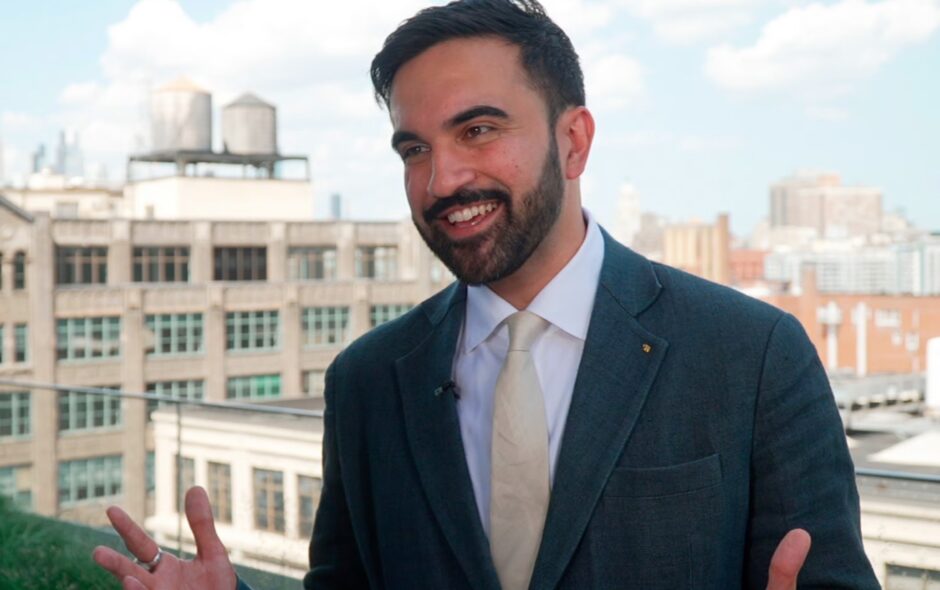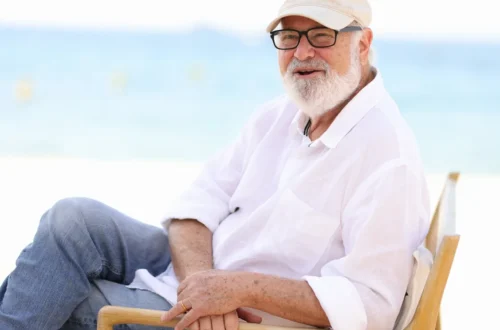On a summer afternoon in Astoria, Zohran Mamdani cuts an unassuming figure, striding past corner stores, halal butchers, and coffee shops with the ease of someone who belongs. He grew up on these blocks, where languages and cuisines overlap as naturally as subway lines. Today, he is more than a neighbor—he is one of the most talked-about political figures in New York City, a mayoral frontrunner whose campaign has become a referendum on whether bold progressive politics can govern the country’s largest metropolis.
Mamdani’s story is global before it is local. He was born in Kampala, Uganda, in 1991, into a family where art and politics were the family business. His mother, Mira Nair, is an internationally celebrated filmmaker known for Salaam Bombay! and Monsoon Wedding. His father, Mahmood Mamdani, is a Ugandan scholar whose writing on colonialism and post-colonial states has influenced generations of academics. This unusual parentage—half cinematic vision, half political theory—was the backdrop of his childhood.
When Mamdani was still a boy, the family left Uganda, spending time in South Africa before settling in New York. By age seven, he was a Queens kid, attending public school and soaking up the rhythms of Astoria. He remembers the subway rides, the neighborhoods where immigrants from every continent lived side by side, and the sense that New York, for all its noise and chaos, could contain the world.
He entered the Bronx High School of Science, one of the city’s most competitive magnet schools. There he discovered not only a talent for academics but a conviction that science and math were not his destiny. Instead, he gravitated toward questions of history, identity, and power. That interest deepened at Bowdoin College in Maine, where he majored in Africana Studies. He immersed himself in courses on liberation struggles, race, and diaspora, and he also organized politically, co-founding a campus chapter of Students for Justice in Palestine. It was in these years that his politics sharpened: not content with the abstract, he was drawn to movements that demanded immediate change.
After graduating, Mamdani returned to New York and took a job as a housing counselor, helping tenants in Queens facing eviction. Day after day, he sat across from families desperate to stay in their homes, navigating bureaucracies designed to exhaust them. These encounters shaped his worldview more than any classroom could. He began to see housing not as a market commodity but as a right, and he came to believe that only systemic change could prevent working people from being crushed by the weight of rent and speculation.
But politics was not his only outlet. He was also making music. Under the name Young Cardamom, he recorded rap tracks about diaspora, identity, and family, often in collaboration with Ugandan rapper HAB. Their song “Nani,” a playful tribute to his grandmother, went viral in East Africa and even appeared on the soundtrack of Queen of Katwe, his mother’s Disney film about a Ugandan chess prodigy. For a time, he seemed equally invested in art and activism. “Music gave me a way to talk about who I was,” he has said, “but politics gave me a way to change what I saw.”
In 2020, inspired by the insurgent energy of Bernie Sanders’s presidential campaign and Alexandria Ocasio-Cortez’s stunning victory in Queens, Mamdani decided to run for office himself. He challenged Aravella Simotas, a four-term incumbent in the New York State Assembly representing Astoria. Few believed he had a chance. But with a campaign run on shoe leather and volunteer energy, he knocked on thousands of doors and made his case directly to voters. That June, in the Democratic primary, he won. It was one of the biggest upsets in city politics that year, signaling that the democratic socialist wave that had swept AOC into Congress was not a fluke but a movement.
As an Assembly member, Mamdani quickly established himself as an idea generator. He introduced a bill to make buses free across the city, and though it did not pass, he secured a fare-free pilot program in several neighborhoods. He sponsored legislation to strengthen tenant protections and pushed for climate action that linked environmental goals to racial and economic justice. His rhetoric was forceful, but his style was disarmingly clear; he explained policies with the patience of a teacher, bringing constituents into the conversation rather than lecturing them from above.
By 2024, with Mayor Eric Adams mired in scandal and Andrew Cuomo signaling an improbable comeback bid, Mamdani took his shot at City Hall. He announced his candidacy standing before the Queensbridge Houses, the largest public housing development in North America. His platform was sweeping: universal childcare, free municipal buses, city-owned grocery stores to combat food deserts, an expansion of affordable housing, and a rent freeze for stabilized apartments. To pay for it, he proposed higher taxes on the wealthy and corporations. His message was not one of cautious reform but of transformation.
The reaction was swift. Progressives rallied behind him, with endorsements from national figures including Sanders, Elizabeth Warren, and Ocasio-Cortez. Polls showed him quickly overtaking his rivals, especially among younger voters, renters, and immigrant communities. By the summer of 2025, he was leading Cuomo by nearly 20 points in some surveys.
Criticism came just as fast. His outspoken support for Palestinian rights drew attacks from opponents who painted him as extreme. His positions on sex-work decriminalization and public ownership of services were dismissed by some as unrealistic. Mayor Adams even suggested Mamdani’s Shia Muslim faith clashed with “mainstream values,” a remark widely condemned as bigoted. Business leaders worried his tax plans would drive wealth from the city. Yet Mamdani did not retreat. He met with critics, including CEOs, and argued that shared prosperity required shared responsibility. He cast taxation not as punishment but as fairness, insisting that a city that works for all requires the wealthy to pay more.
Mamdani’s personal life remains intertwined with his politics. He lives in Astoria with his wife, animator Rama Duwaji. Friends describe him as earnest, sometimes almost shy, but relentless in conversation about policy. He is as likely to reference his father’s books on colonialism as he is to describe his mother’s films. He sees politics as a form of storytelling: the narrative of who New Yorkers are, and who they might be if the city chose differently.
For the left, Mamdani’s campaign represents a test of whether democratic socialism can truly govern. It is one thing to win legislative seats; it is another to manage a city of eight million people with sprawling agencies, entrenched unions, and massive corporate power. Skeptics say his ideas are too expensive or too idealistic. Supporters counter that the crises of the city—sky-high rents, inadequate transit, and rising inequality—are already unmanageable under the old formulas. The argument is less about feasibility than about imagination: can New York dare to try something different?
The arc of Mamdani’s life suggests he is comfortable with risk. He is the son of two continents, fluent in multiple languages, shaped by cultures that straddle the global South and the immigrant North. He is a practicing Muslim, an artist turned politician, an intellectual who has knocked on doors in every corner of his district. His campaign slogan could be summed up in a single word: belonging. For him, the city belongs not to developers, donors, or entrenched political machines, but to the people who ride its buses, shop in its bodegas, and pay its rising rents.
At thirty-three, he is still young. His career is just beginning. But his rise is already reshaping the conversation not just in New York but across the country. Progressive organizers in other cities are watching closely, seeing in him a blueprint for how to combine grassroots organizing with electoral ambition. His victory in the Assembly proved that democratic socialists can win local power. His mayoral campaign may prove they can wield it.
Whether or not he wins City Hall, Zohran Mamdani has already altered the trajectory of New York politics. He has shown that a candidate with no machine backing, little money, and a platform once considered fringe can emerge as a frontrunner in America’s most complicated city. He has made the possible broader. He has forced the city to debate not just management but vision.
And as he walks the streets of Astoria, stopping to talk with neighbors in English, Arabic, or the cadence of Queens itself, Mamdani embodies the message at the heart of his politics: that New York, in all its vastness, can still be a place where one person’s story collides with millions of others to create something entirely new.




